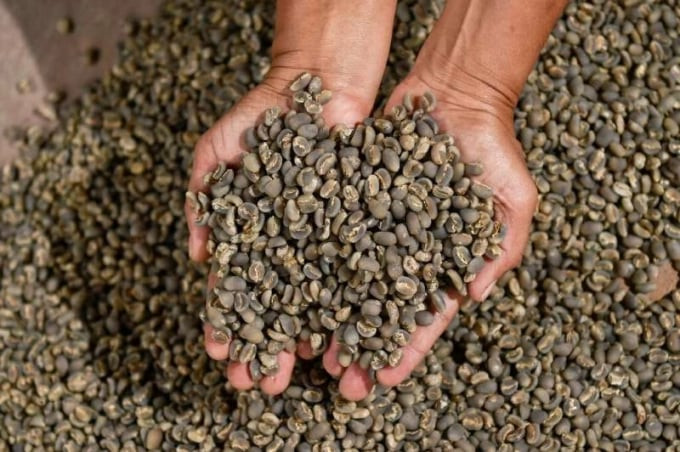Coffee price today August 20, 2024: World coffee prices increase sharply until the end of the year.
Coffee prices today, August 20, are in the range of 117,300 - 118,000 VND/kg, down slightly by 300 VND compared to yesterday. World coffee prices may continue to increase until the end of the year.
Specifically, in Di Linh, Lam Ha, Bao Loc districts (Lam Dong), today's coffee price is purchased at 117,300 VND/kg.
In Cu M'gar district (Dak Lak), the coffee price today is at 118,000 VND/kg. In Ea H'leo district (Dak Lak), Buon Ho (Dak Lak), the coffee price today is purchased at the same level of 117,900 VND/kg.
Similarly in Dak Nong province, today's coffee purchase price is at 118,000 VND/kg in Gia Nghia and 117,900 VND/kg in Dak R'lap.
In Gia Lai province, coffee price today is at 117,900 VND/kg (Chu Prong), in Pleiku and La Grai the price is 117,800 VND/kg.
Today's coffee price in Kon Tum province is purchased at 117,900 VND/kg.
The domestic coffee market decreased slightly by 100 VND compared to the same time yesterday.

Global coffee prices have been strong in recent months. Robusta futures on the London exchange hit a record high last month, above $4,000 a tonne. Arabica futures on the New York exchange have also traded at highs, above $2 a pound, or about $4,444 a tonne.
Kosuke Nakamura, import manager of UCC Ueshima Coffee in Japan, once said that the price of $2,000 per ton for robusta coffee beans was very high. The current price of robusta coffee beans has far exceeded the price that many people could not imagine 1-2 years ago.
At the end of the most recent trading session, the price of Robusta coffee in London for September 2024 delivery increased by 1 USD/ton, at 4,666 USD/ton, and for November 2024 delivery increased by 1 USD/ton, at 4,459 USD/ton.
Arabica coffee price for September 2024 delivery decreased by 1.60 cents/lb to 243.85 cents/lb, and for December 2024 delivery decreased by 1.40 cents/lb to 242.70 cents/lb.
Experts say the rise in coffee prices reflects a number of factors. The El Nino phenomenon has caused coffee production in Vietnam - one of the world's largest coffee producers - to fall significantly last year. Logistics problems, especially changes in shipping routes due to geopolitical tensions, have slowed down deliveries and pushed up prices.
The imminent entry into force of the European Union Anti-Deforestation Regulation (EUDR) has led to European companies increasing coffee imports ahead of its implementation, putting further pressure on prices. Global coffee production has declined in recent years, particularly in Brazil, leading to shortages and higher prices.




